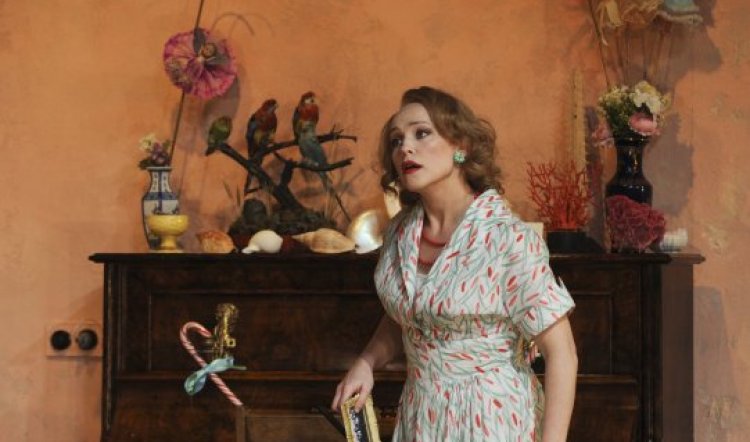
SUMMER OF THE SEVENTEENTH DOLL
SUMMER OF THE SEVENTEENTH DOLL, Upstairs Theatre Belvoir St; 24 September-13 November 2011. Photos by Heidrun Lohr; main: Susie Porter; right: Helen Thomson
At five minutes under three hours including two intervals, Ray Lawler’s groundbreaking, history-making play is still – more than 50 years after its premiere production – funny, tragic, meaningful and fresh. It’s a tribute to the play, its current director Neil Armfield and to the cast he’s assembled that the famous old warhorse of Australian theatre (the warhorse, more like) can bear the weight of expectation, hype and history as easily as it does.
On the face of it, the story of “The Doll” is a simple one: each year for the past 16, Barney and Roo have returned to Melbourne from the Queensland cane fields for the five-month, between seasons lay-off. Their pockets stuffed with cash from the hard yakka of cane cutting they bring nothing else but a kewpie doll – for Olive. She and Nancy are the girls who patiently stick at their jobs as Carlton barmaids while looking forward to the almost half year of live-in love and liveliness that summer promises. Yet this year – the seventeenth – things are awry: Nancy has finally given up on Barney and married another; she’s gone. Olive has another friend for Barney to meet – Pearl, a nervous social climber – but after a promising “homecoming” it’s clear that nothing will be the same again.
Beneath the simple surface there is so much undercurrent to the play it’s little wonder one is swept away by it. For a start, the archetypal good bloke Roo (perfect weary, awkward Steve Le Marquand) isn’t named for the little Aussie hopper but is actually Reuben. This psychic burden must have weighed on him since childhood – imagine the teasing. So he is not only old before his time through backbreaking labour, but also prematurely exhausted from the effort of extra manliness that being called Reuben has required of him.
His mate Barney (unselfconsciously charming larrikin Dan Wyllie) has no similar cares, which is why Nancy’s abandonment is so shocking to him. He is – in his own nonchalant mind – still the boy who first made the trip to Melbourne 16 years before. His winsome laddishness is frayed around the edges. Alcohol and heedless fun are no longer sufficient to keep at bay the ghosts of past and future that now haunt his frightened eyes.
The women, of course, occupy a very different place in the world. Olive’s freewheeling, independent approach to life and love predates the young Germaine Greer by a decade or so when a similar attitude would produce The Female Eunuch. But Olive is a working class barmaid of the mid-1950s and society is even less ready for her then than it would be for the middle class feminists of the 60s. As played by the wondrous Susie Porter, Olive is still – in her imagination – the gorgeous young thing to whom the men returned, helpless as moths, to the flame of her youth and succour. But seventeen years is a long time, especially for a woman. On the cusp of middle age, Olive is a caricature of her younger self: same make-up, same hair-do, same outlook, same non-expectations; she is a tragedy waiting to happen.
The recently widowed Pearl Cunningham is an unlikely friend for a woman such as Olive. Her immaculate gloves and sophisticated outfits signal her social aspirations as clearly as if she were wearing crampons and carrying a rope. She is determined to rise above her current plight – behind the bar and without a respectable man. And, until she meets them, entertained faint hopes of making over one of the cane cutters to suit. Helen Thomson is at once hilarious and painfully sad as the tight-lipped disapprover. Pearl so wants to join in yet is also appalled by their carefree lack of gentility – the trait she most craves. She is brittle with the effort of containing her distaste and bewilderment and looks as if she might shatter if touched.

On the periphery of the rambunctious group is Olive’s mother, Emma, and next door neighbour Kathie. Known as Bubba, young Kathie is now 22. She has grown up toasting her hands and heart in the warmth of Olive’s year-round niceness The summer visitors still treat her like a kid and, like Olive she has lived so much in the past and in hope of the fun they bring, she has little inkling of other possibilities. Her simplicity is that of her times: “teenager” is something she never was as it hadn’t quite been invented. And with Olive as her unwitting mentor, the option of being a woman hasn’t yet occurred to her either. Yael Stone is beautiful and sad as the still-optimistic child-woman for whom reality is about to well and truly bite.
In contrast the sardonic Emma is a woman who long ago bit back at reality and didn’t like the flavour. But unlike her daughter, she’s understands it and is resigned to it and bats back with determination at everything Fate chucks at her. Robyn Nevin is brilliant in this subsidiary but pivotal role; unselfish as an actor and bitterly scathing as the character, she scorches the stage whenever she enters.
Also entering – physically – late in the piece, is Roo’s bête noir, the young gun cutter Johnnie Dowd (TJ Power). He’s spoken of long before he appears because he’s displaced Roo, who injured himself in his efforts to keep up. So his entrance is crucial and the late casting of Power turns out to be lucky as he projects both the inevitable and the unwilling as Roo’s nemesis. Barney’s impending defection to the Dowd team after a lifetime of loyal friendship to Roo is also logical; male friendship and mateship have rarely been so piteously rendered.
All the above should suggest that Neil Armfield has steered a fabulous crew on an enthralling journey – and took a rapturous audience along for the ride. I didn’t like Ralph Myers’ set – too spacious and warehouse-like, forcing the actors to gallop from place to place and from entrance to exit and back again. The claustrophobia of the meanly proportioned Carlton terrace that should have further pressure-cooked the reluctant funsters is entirely absent, as is any sense of the house’s architectural logic. It’s also peculiar that the semi-abstraction of the set – which should surely have lino on the floor rather than rough bare boards – is at odds with Dale Ferguson’s faithfully accurate period costumes. It’s also at odds with Alan John’s incidental music, delivered via a battered player piano and beautifully evoking nights around it, long gone, and the melancholy of the present.
Lino quibble aside, this production of Summer of the Seventeenth Doll is a joy and a reminder of how and why theatre is our lifeblood and cultural oxygen, from which all else is brought to life.



